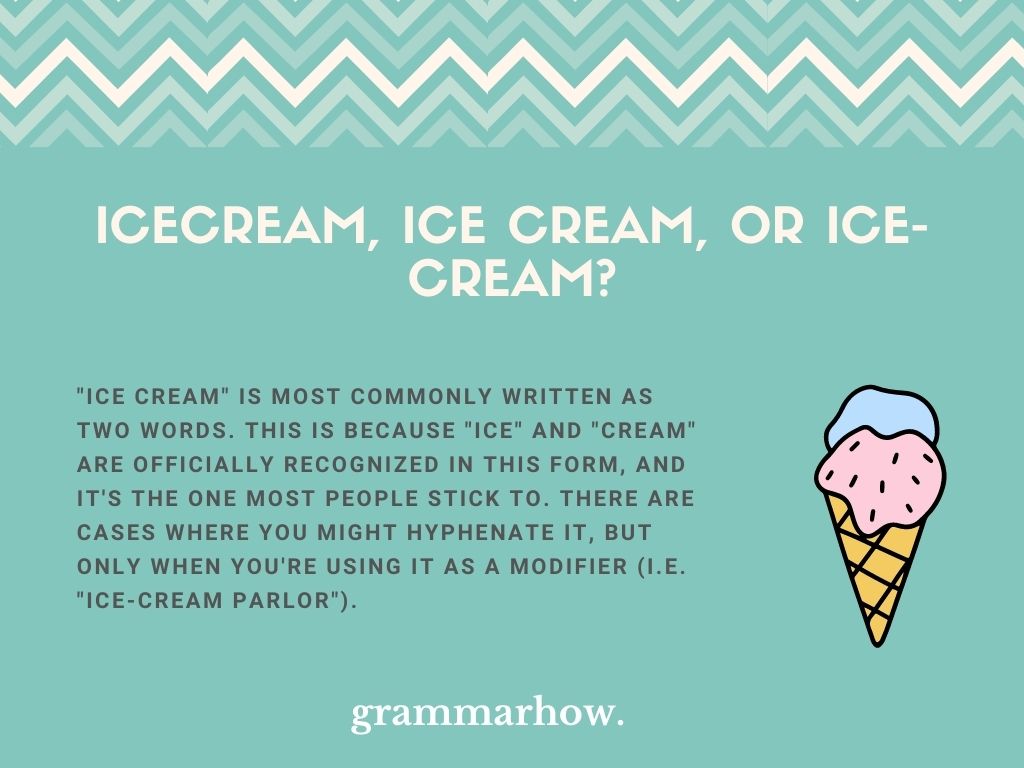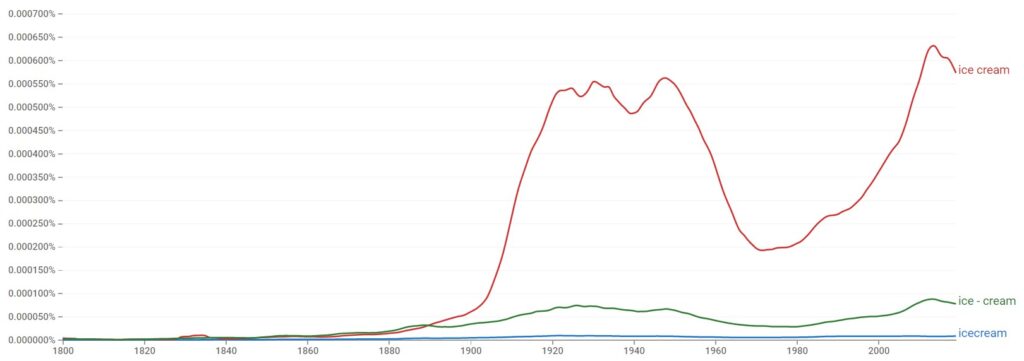We can use “ice cream” as a noun or adjective. It would help to know what the differences between these two forms are before you use them in your writing. So, this article will address whether it’s one or two words (and whether it’s hyphenated).
Ice cream vs. Ice-cream vs. Icecream
“Ice cream” is most commonly written as two words. This is because “ice” and “cream” are officially recognized in this form, and it’s the one most people stick to. There are cases where you might hyphenate it, but only when you’re using it as a modifier (i.e. “ice-cream parlor”).

According to Google Ngram Viewer, “ice cream” is by far the most popular choice of the three in this article. You can see from the clear differences in the lines on the graph that the noun form that’s split into two words is your best choice.

Of course, “ice-cream” is the second-most popular choice since it’s the adjective form that we can use when modifying. However, there are no cases where “icecream” should be grouped.
We can refer to The Cambridge Dictionary and The Oxford Dictionary to learn more about its spelling. Both dictionaries state that “ice cream” is a noun and should be written as two separate words.
They both also include variations on the spelling in some of their examples when a second noun comes after the phrase. In these examples, the hyphen between “ice-cream” shows how the modification works.
If you’re stumped about the differences between nouns and adjectives, check these examples out:
- Noun: I would love to have some ice cream!
- Adjective: I’m not sure you will go to the ice-cream parlor down the street!
Is “Icecream” One Word?
“Icecream” is never correct as one word. The spelling variation is far too jarring. Even though some people like to group the words, “ice” and “cream” do not work well when written together like this, making it much harder for people to read.
Check these examples out to help you with it:
- Correct: I’d love to go and get some ice cream right now!
- Incorrect: This isn’t the icecream that I ordered!
- Correct: This ice-cream flavor is one of my all-time favorites!
- Incorrect: I don’t know where the icecream van is, and it’s making me sad!
Is “Ice cream” Two Words?
“Ice cream” is two words in almost all cases. We mainly use it in this form as a noun, which applies whenever we’re talking about “ice cream” as a product or food item. Some people also avoid the hyphens when it modifies another noun (i.e. “ice cream parlor”).
There is no right or wrong answer when it comes to hyphenating “ice cream.” It all depends on the context.
Here are some examples:
- I’ll take the kids to go and get some ice cream while you keep yourself busy here.
- It’s not ice cream if you’re not enjoying yourself with every bite!
- This ice cream is going to be the death of me! I simply cannot get enough.
- My favorite flavor of ice cream has got to be mint chocolate chip!
Is “Ice-cream” Hyphenated?
Though uncommon, “ice-cream” is acceptable when hyphenated. We write it in this form when it is used to modify another noun in a sentence. “Ice-cream parlor” is a good example of this, where “parlor” is modified to show that “ice cream” is sold there.
The AP Stylebook teaches us all we need to learn about hyphen rules. Hyphens are linkers in AP Style, and we use them whenever more than one word modifies the same noun in a sentence.
Since “ice cream” is two words, a hyphen should be present whenever a noun comes directly after it.
Here are some examples that might help you with it:
- I don’t want to go to the ice-cream store just yet! I haven’t decided what I want.
- The ice-cream man won’t be serving it forever! Make your choice now!
- Let’s go see what the ice-cream van has to offer today.
- I have an ice-cream headache, and I don’t know how to get rid of it!
Is “Cream” Capitalized In The Word “Ice-Cream”?
When hyphenated, you rarely need to capitalize either part of “ice-cream.” It is not a proper noun, so capitalization does not apply.
You might find that when you write it in a title, it is useful to capitalize both parts. “Ice-Cream” works well in a title when every other word is capitalized.

Martin holds a Master’s degree in Finance and International Business. He has six years of experience in professional communication with clients, executives, and colleagues. Furthermore, he has teaching experience from Aarhus University. Martin has been featured as an expert in communication and teaching on Forbes and Shopify. Read more about Martin here.
